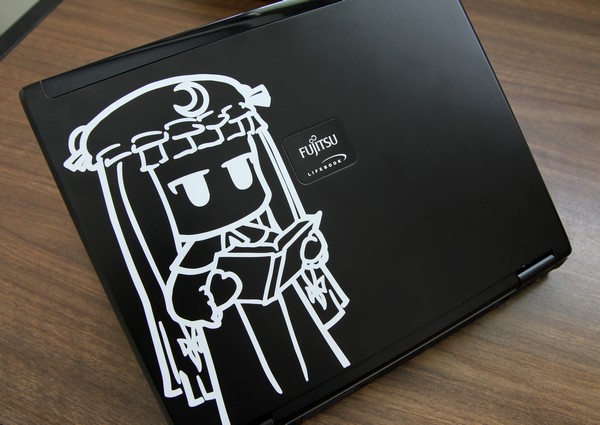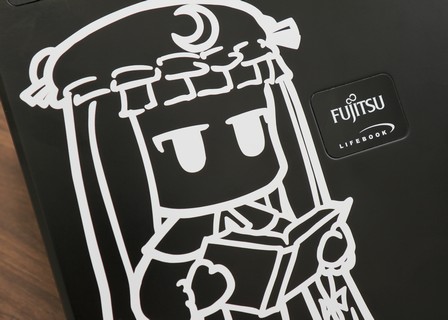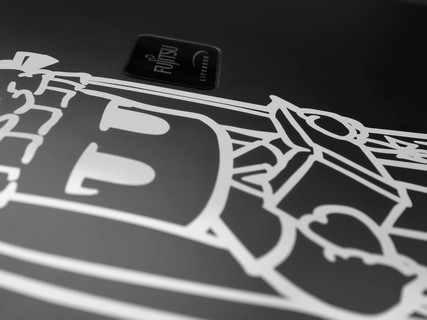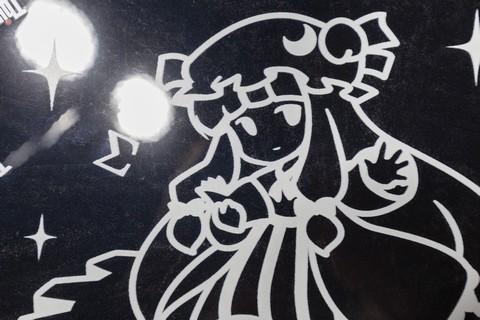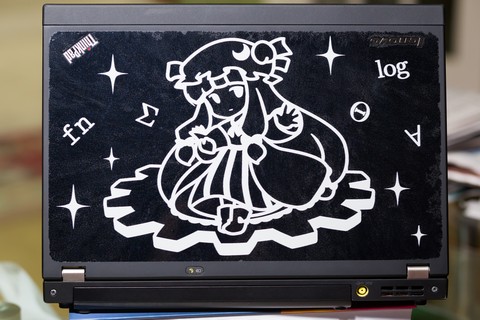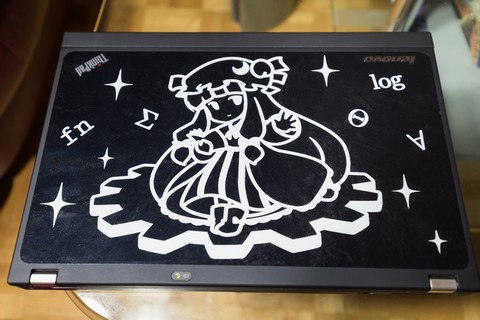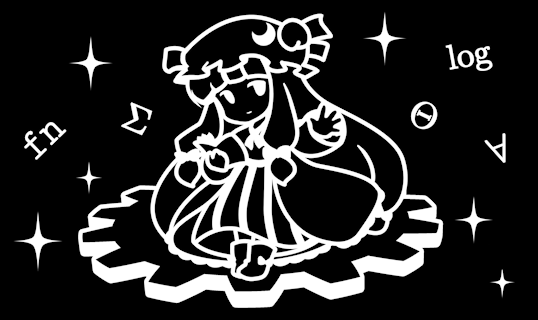 Patchouli Knowledge laptop sticker
Patchouli Knowledge laptop sticker
Introduction
In the otaku world, there are people who decorate their cars with stickers of (usually cute female) characters from anime and games. The adorned cars are called itasha (痛車), meaning painful car. Now, I’m not a car enthusiast – I treat them in a utilitarian way – but am a computer enthusiast. I like to select the parts for my PCs and build them myself. I’m proud of owning them and maintaining them in a usable condition (software and hardware) to serve my needs. Because I am an anime fan as well, it was only a matter of time before I would decorate my computers in the same manner as an itasha.
My interest was sparked around while browsing the web, coming across this photo of a laptop cover with a transparent sticker of Cirno (チルノ) from Touhou Project (東方プロジェクト). A few months later in , I resolved to get a similar-looking sticker for my own laptop too. I chose the character Patchouli Knowledge (パチュリー・ノーレッジ) for myself because I thought, and still think, that her personality is reminiscent of mine. She likes to stay indoors, keep away from people, and read books; she is quiet, extremely knowledgeable, and strong in battle. By having her on my laptop, I figured I could make a subtle statement about myself.
sticker
I commissioned Mingye Zhu (fenrysk-art) in for this artwork, and requested to imitate the style of colonel_AKI’s Maid-san no Hibi comic. After searching a while for suitable print shops, in I asked Shinzo Media to produce the sticker for about 20 CAD. The final product is made of white vinyl (PVC), cut into pieces according to the artwork. That means each white part is a piece, and the whole design has many edges, which is liable to peel with rough handling. Note that the white lines were thickened between the published artwork and the final physical product. I actually wanted to have a result like the Cirno photo – a rectangular transparent sticker with opaque parts printed on – but am satisfied enough with what I got. In the future, I will keep looking for better ways to have a proper transparent sticker, because I know I want to decorate more of my computers. With this done, I became the proud owner of an ita-laptop! The sticker was applied to my Fujitsu Lifebook S6240, bought in ; the laptop was about a year away from being retired.
sticker
As my Fujitsu laptop progressively developed hardware problems, in I bought a new Lenovo ThinkPad X220 to replace it. Although I wanted an anime character sticker for it too, I was busy with work, coding, and social things, so I shelved the idea for years. Another character I grew to like was Kaname Madoka (鹿目 まどか) from Mahou Shoujo Madoka Magica (魔法少女まどか☆マギカ) for her strength, optimism, and godliness. However, my laptop would be seen by many laymen not well-versed in anime, which influenced my choice of characters. Madoka’s puffy magical girl dress is reminiscent of kids’ shows like Pretty Cure and Ojamajo Doremi. I ended up choosing Patchouli Knowledge again because I liked the book she was holding and her gown looks somewhat like a wizard’s robe.
In (again with the laptop being just under 5 years old), I took the plunge and commissioned Yoli-chan to draw something new. The themes that I was aiming for were friendly and magical. She delivered a fine piece of art, then I spent some time adding math symbols to express my love of computer science. I sent the design to Signs.com for printing as a rectangular transparent sheet with opaque white sections. The physical quality is acceptable but not perfect – the details are slightly fuzzy, the white paint has an unnecessary texture, and the back side doesn’t fully stick to the laptop cover (applied in ).
The bits of text that I added to the image are rendered in the Computer Modern font and typeset in LaTeX. Both the font and the typesetting tool are commonly encountered in math, science, and engineering. Here is an explanation of the symbolism in elements of the image:
The gear below Patchouli is an icon for engineering, because I enjoy building reliable software systems and running them to solve real-world problems.
The
fnrepresents a function declaration. Defining and calling functions are both essential concepts in programming. Also, recursive functions are a powerful idea that every advanced programmer should know. The keyword to declare a function isfnin the Rust programming language (which I started learning later in ),funin ML,functionin JavaScript,\in Haskell, λ in lambda calculus, et cetera.The Σ (Greek capital sigma) represents summation, an important mechanism in discrete math and algorithm proofs. In theoretical computer science we often work with finite sequences of integers, whereas in pure math it is more common to work with real numbers and integrals.
The log represents the logarithm function, which appears in the time or space complexity of efficient algorithms such as binary search, merge sort, and the FFT. The word also represents the act of logging data, which is an invaluable tool for debugging problems or simply tracking the state of a system over time.
The Θ (Greek capital theta) is a part of big O notation, which is used to describe how much time or memory an algorithm consumes. Big theta describes a tight asymptotic bound, which is more precise than big O which merely represents an upper bound. Using big theta instead of big O whenever possible is a step toward mathematical rigor.
The ∀ (turned A) represents universal quantification (for all), a critical component of mathematical logic. Computer science is a branch of mathematics (mainly induction, set theory, combinatorics, graph theory), and proofs give us high assurance that non-trivial algorithms work correctly as intended.
